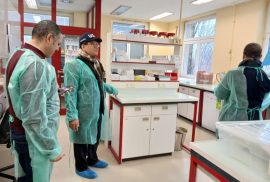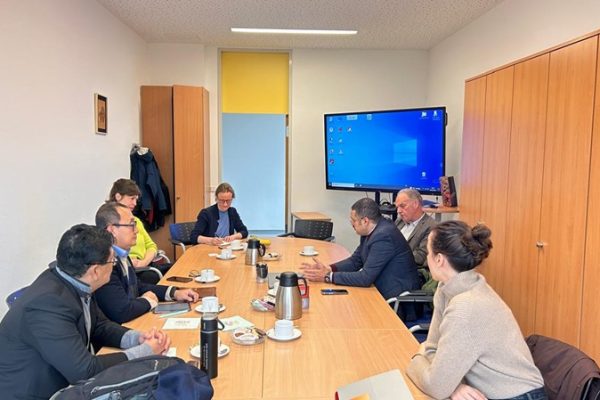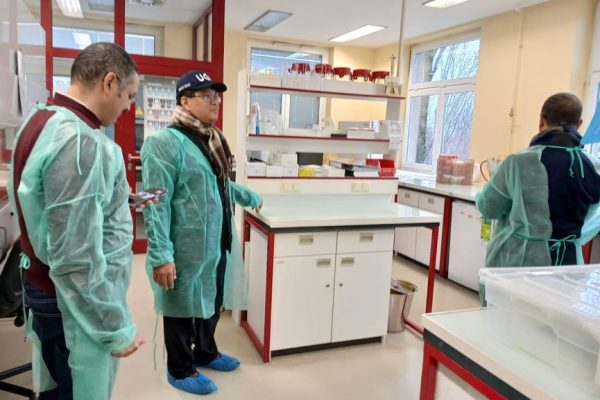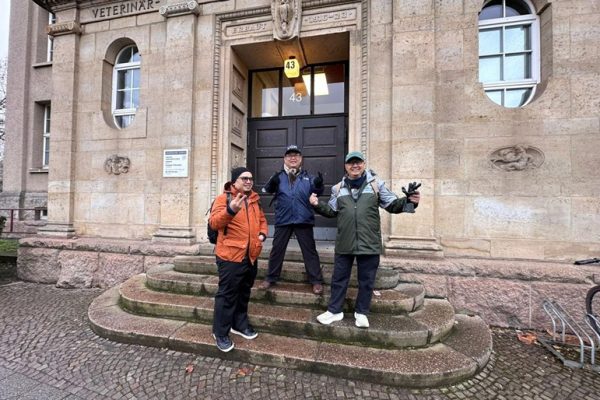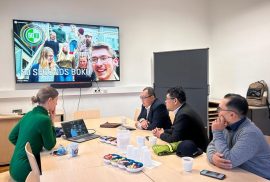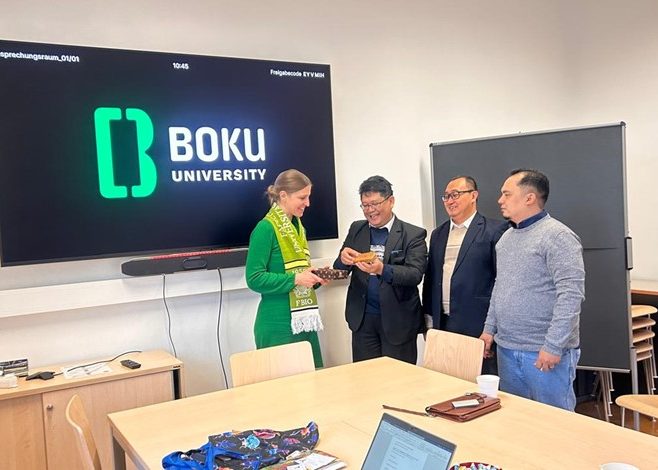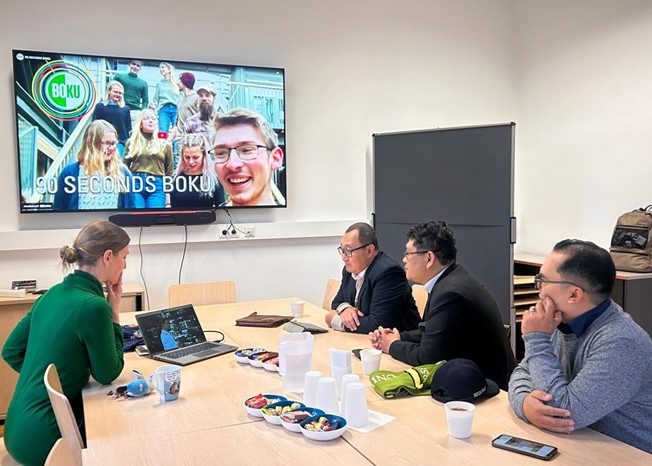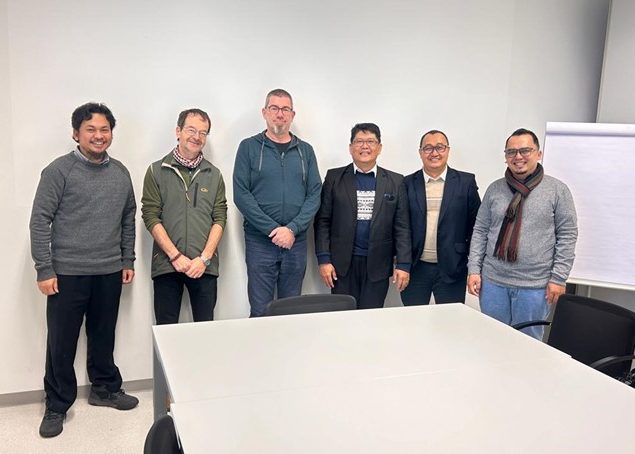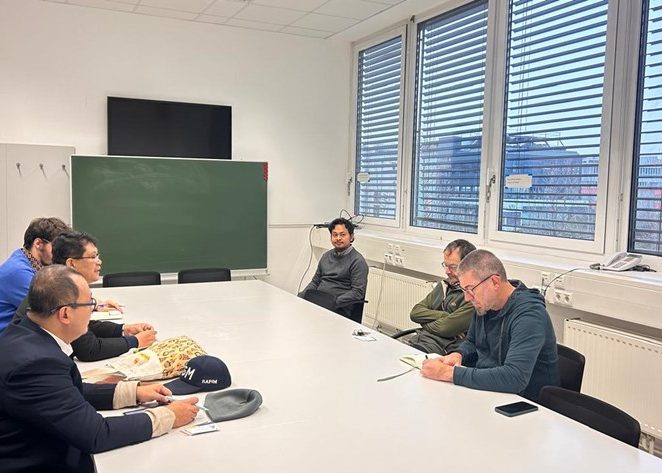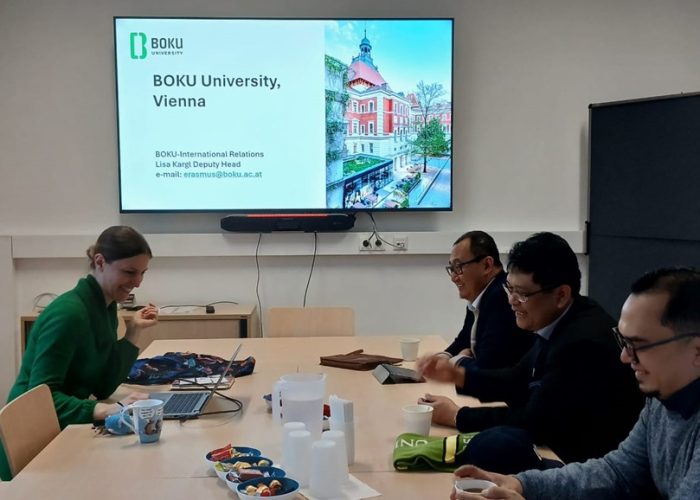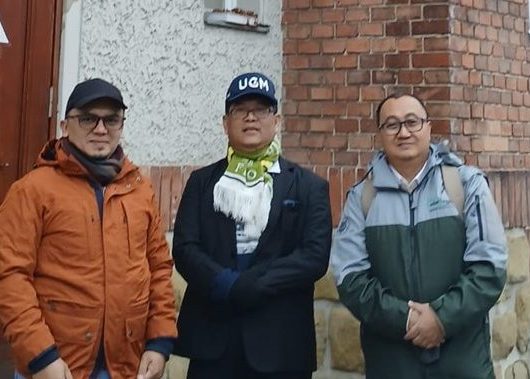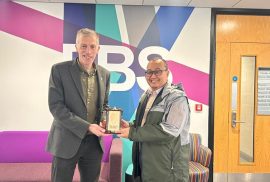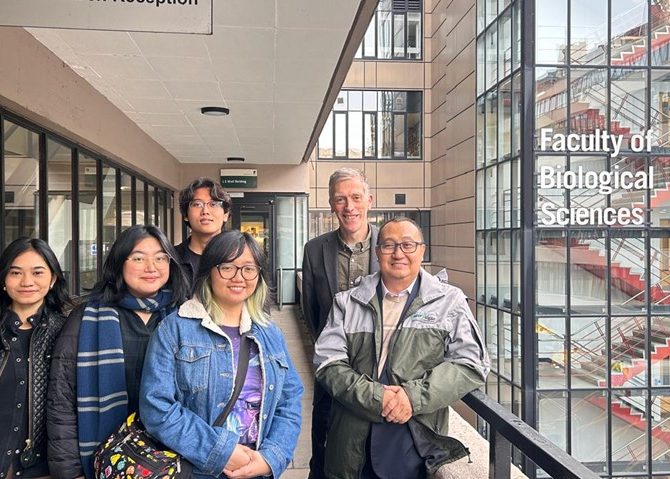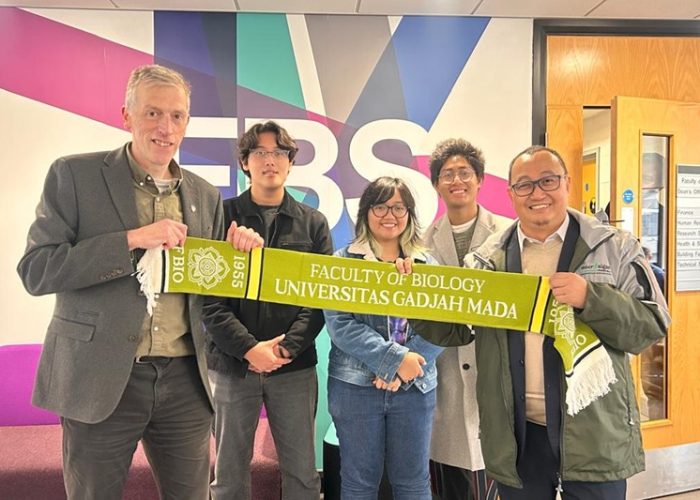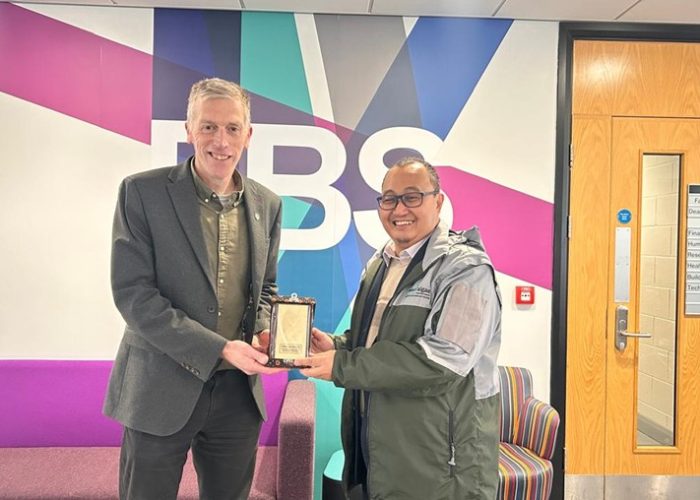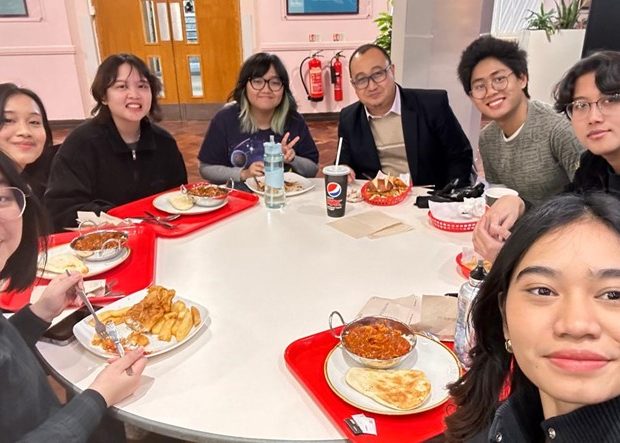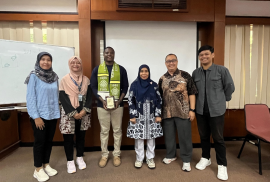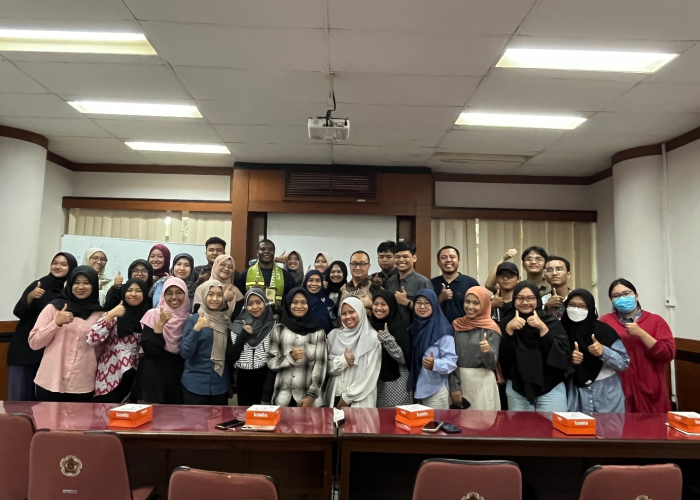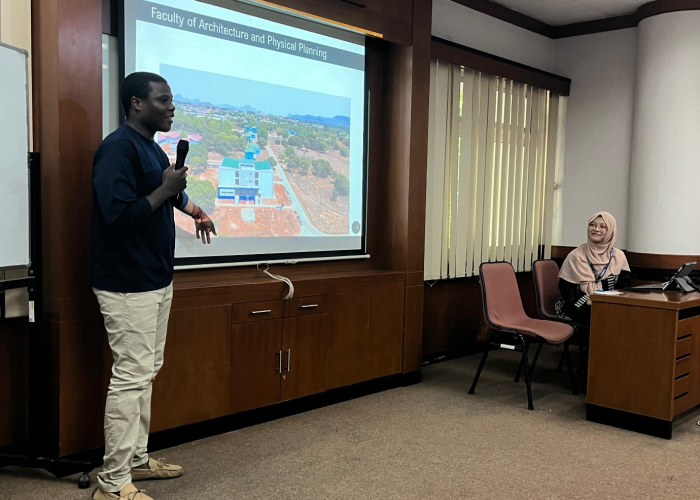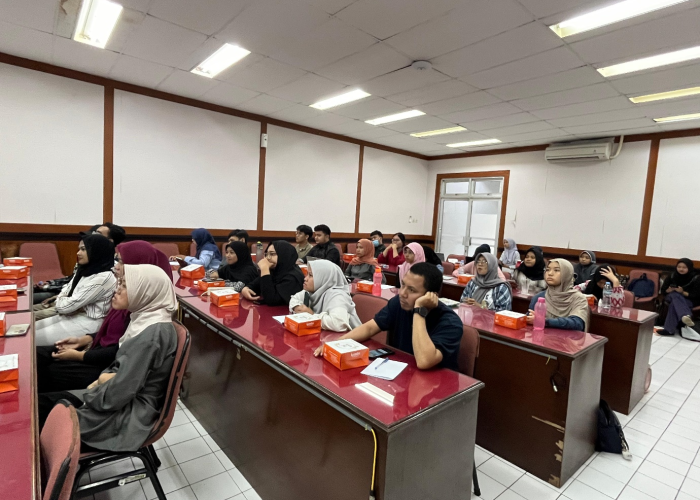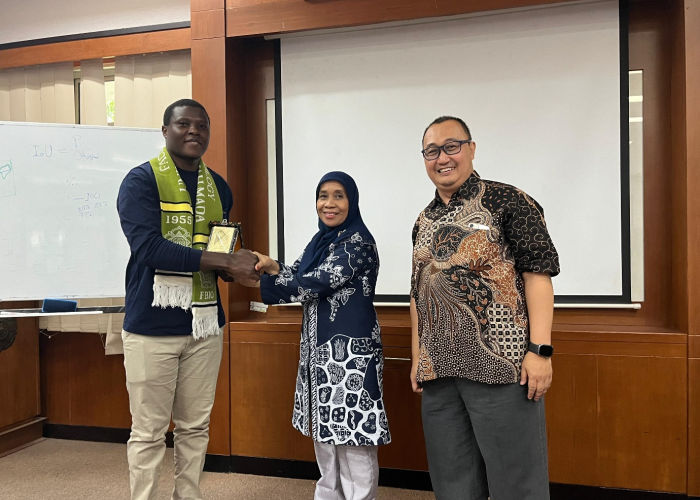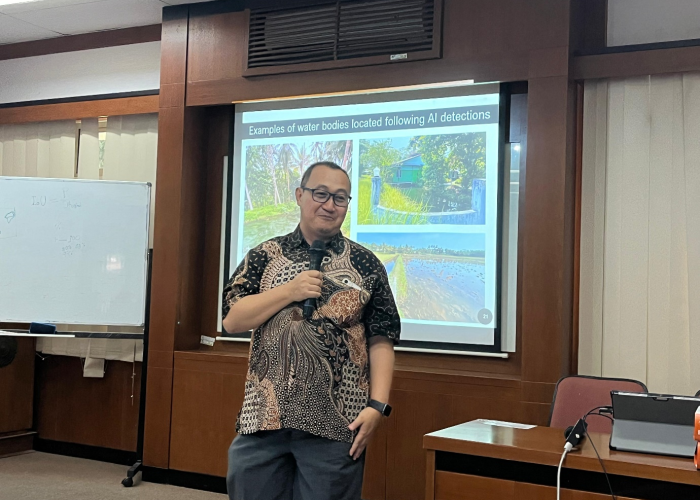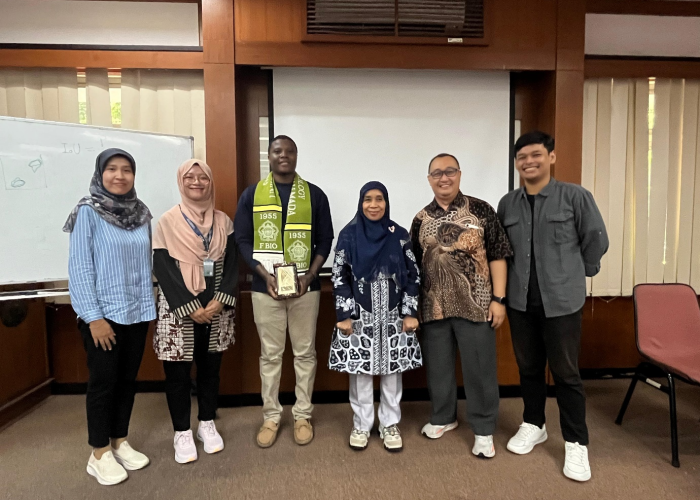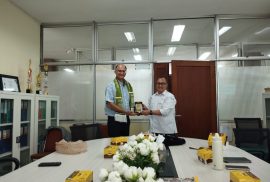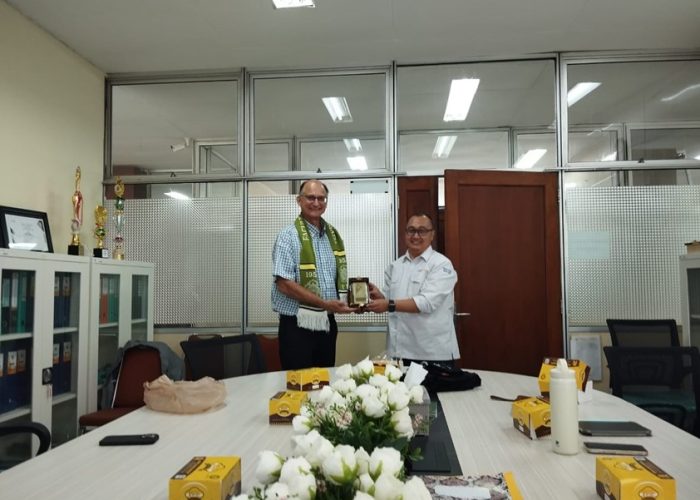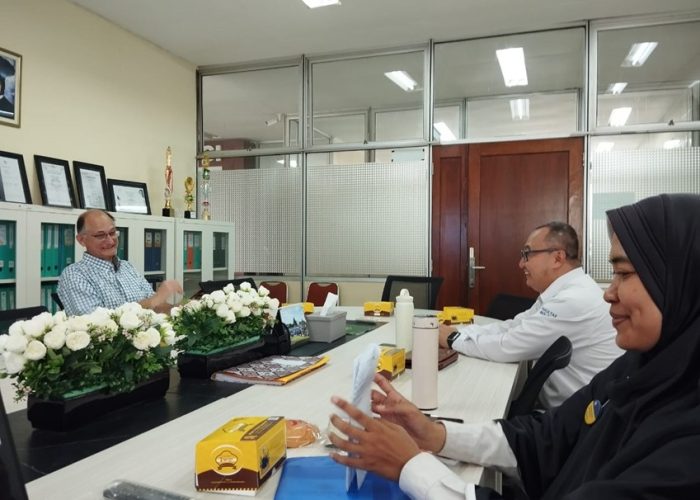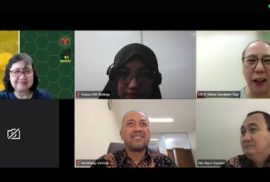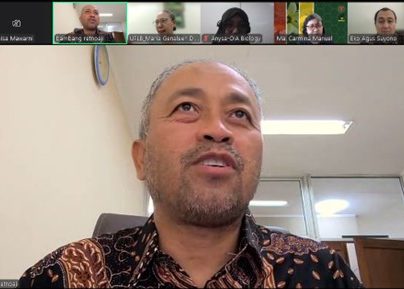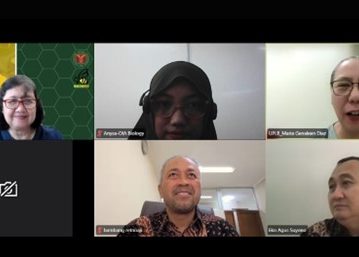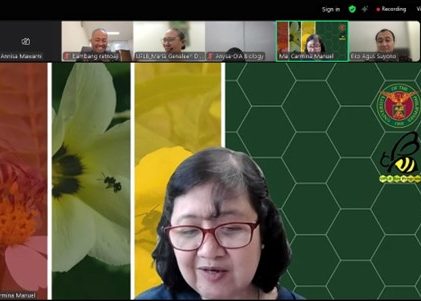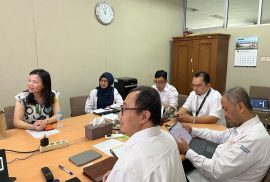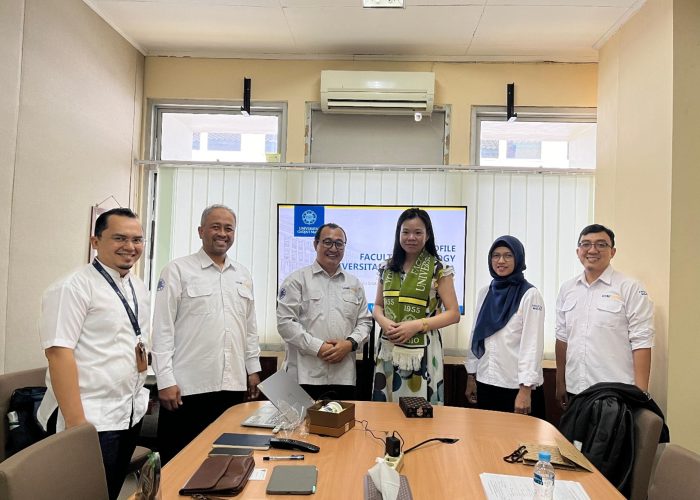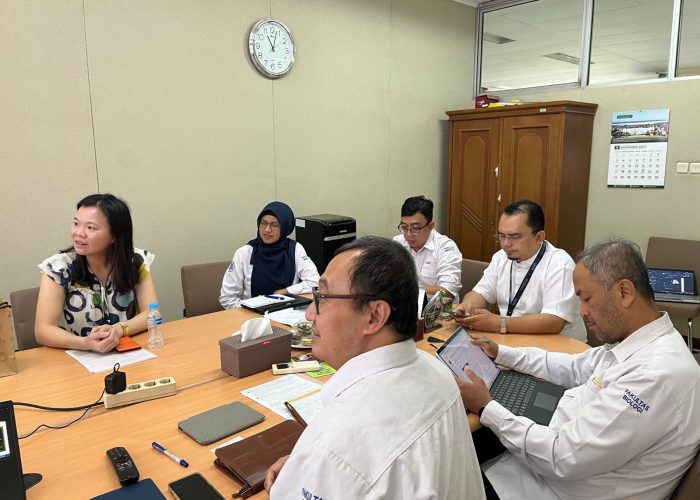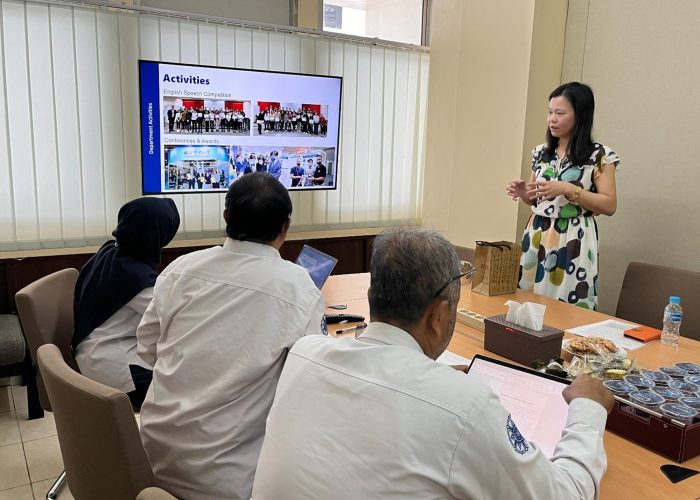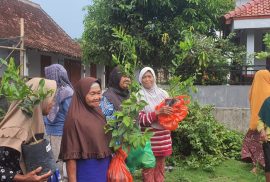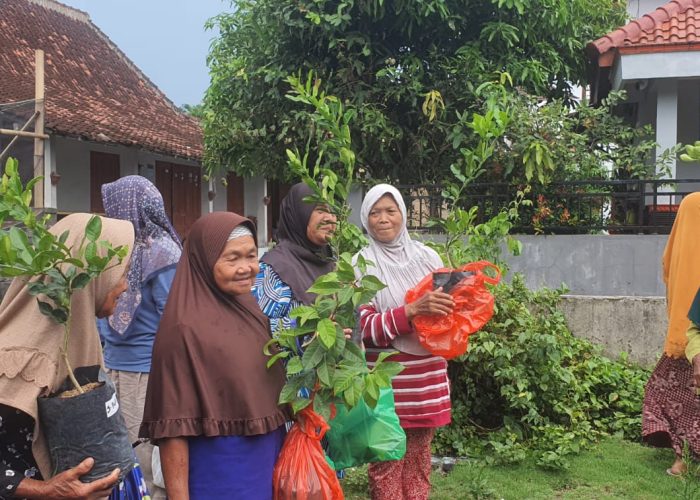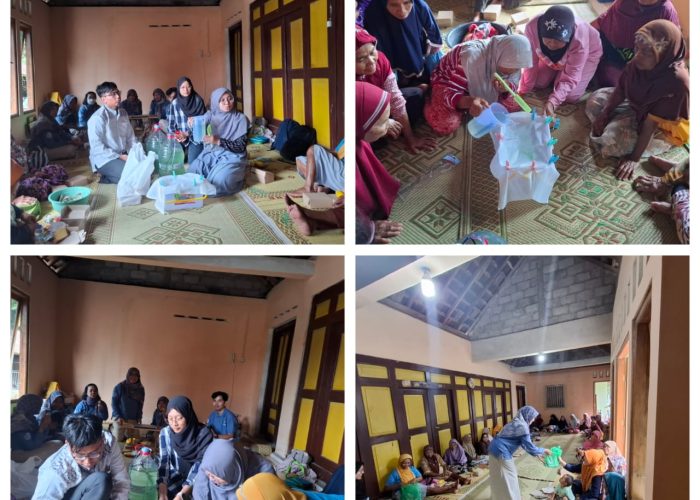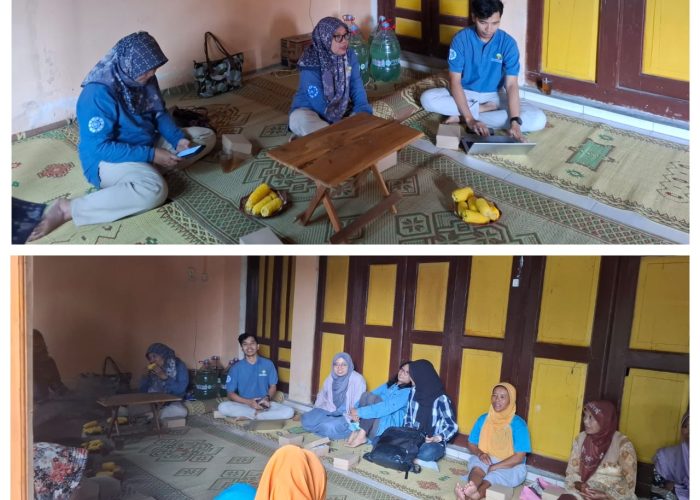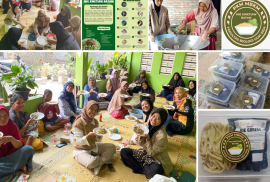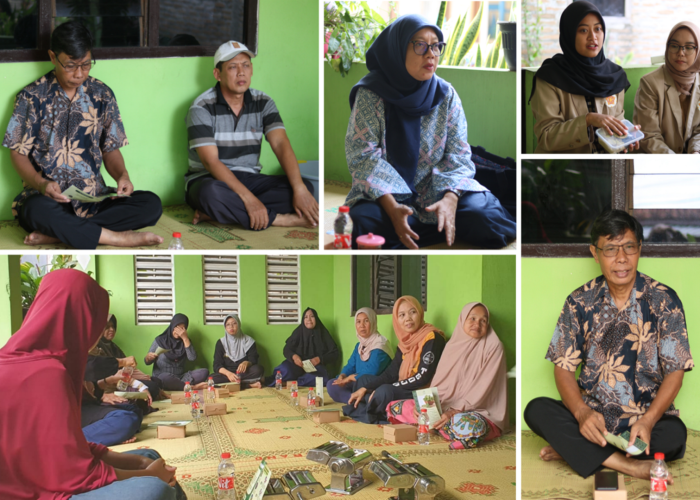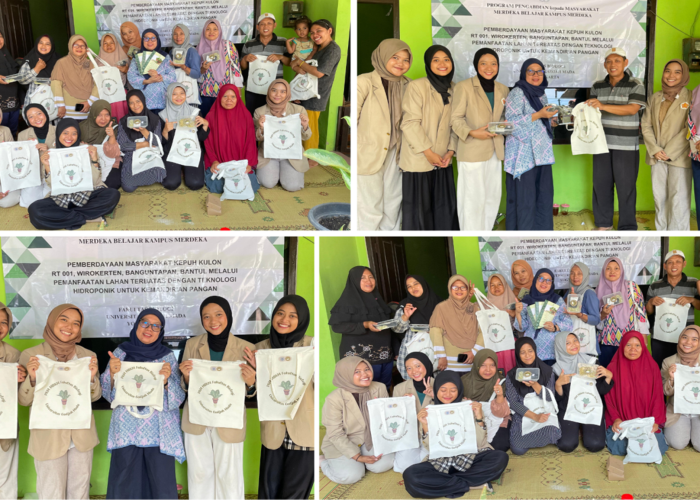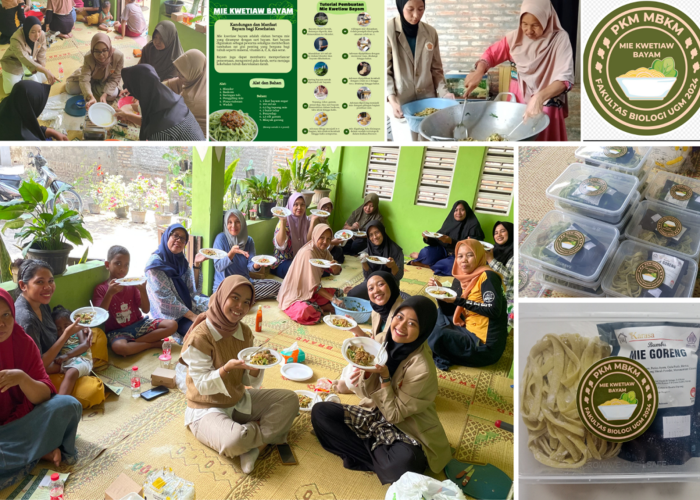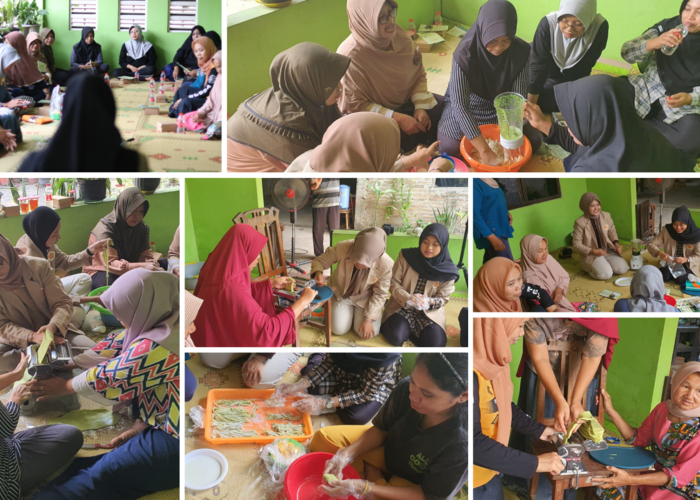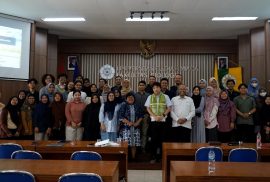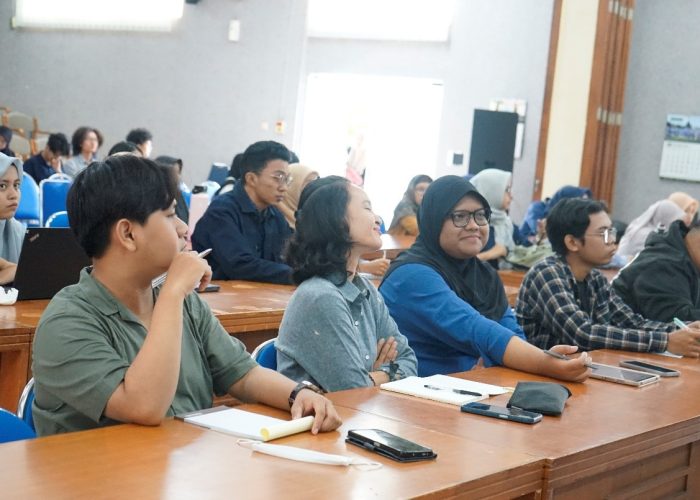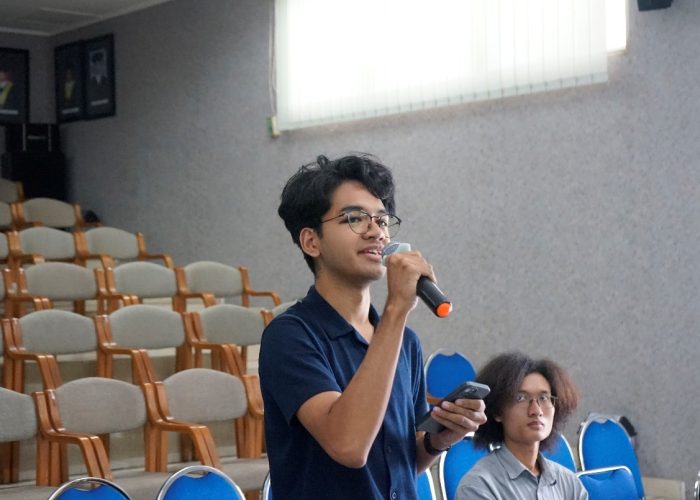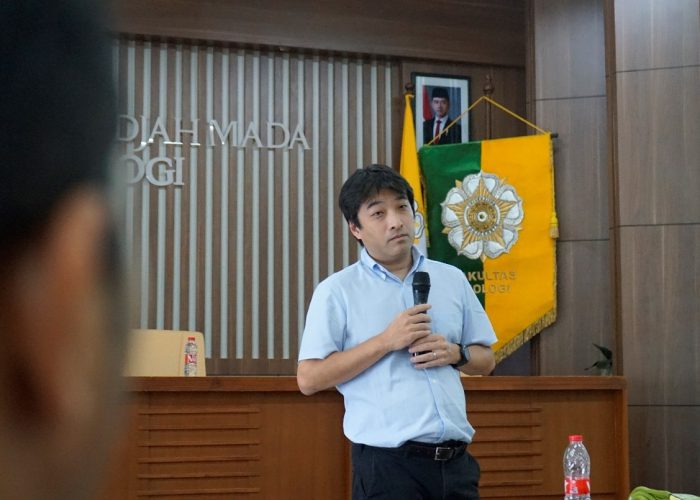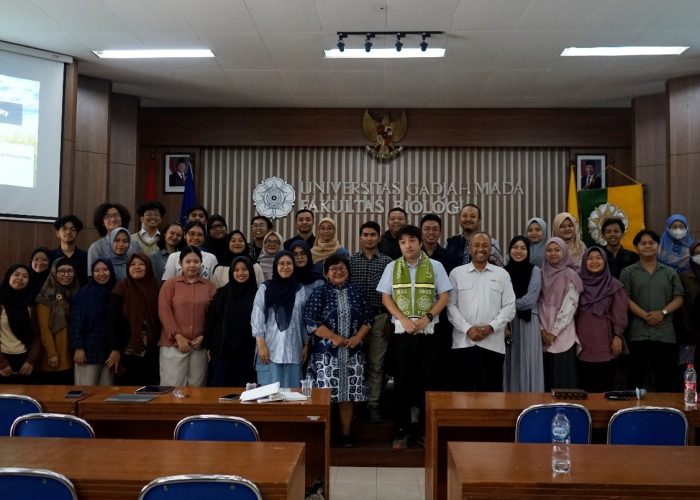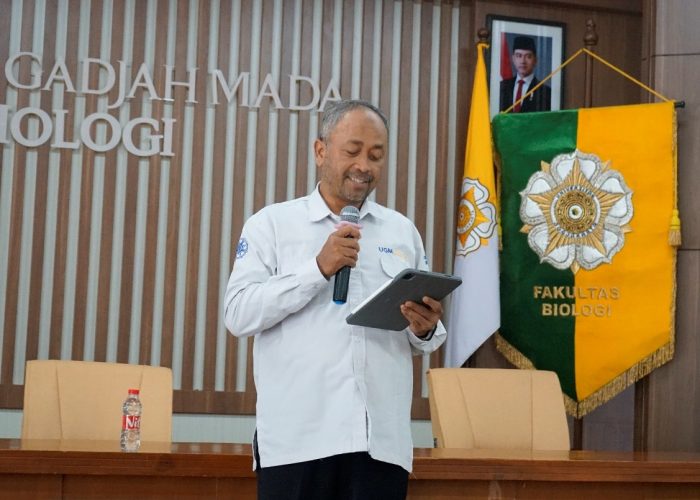Arsip:
Cooperation
Leipzig, 10 December 2024 – The UGM Faculty of Biology team consisting of Prof. Dr. Budi Setiadi Daryono, M.Agr.Sc. as Dean, Dr. Eko Agus Suyono, M.App.Sc. as Vice Dean for Research, Community Service, Collaboration and Alumni Affairs, and Dr.rer.nat. Abdul Rahman Siregar, M. Biotech. carried out a visit to Leipzig University, Germany last Tuesday (10/12). The visit was an effort to strengthen the recognition and collaboration of the Faculty of Biology UGM with various of the world’s best universities.
Leipzig University is one of the oldest universities in the world and the second oldest in Germany. Founded in 1409, this university has successfully produced tens of thousands of alumni spread throughout the world. The Faculty of Biology UGM has collaborated, especially in research, with the Institute for Animal Hygiene and Public Veterinary, Leipzig University. Collaboration with Prof. Uwe Truyen and Dr. Ahmed Abd El Wahed’s research activities and visiting professor at the Faculty of Biology have been implemented since 2023. This collaboration emphasizes the One Health approach which involves the integration of human, animal and environmental health to answer global challenges such as zoonotic diseases and antimicrobial resistance.
The visit was welcomed by Prof. Uwe Truyen and Dr. Ahmed Abd El Wahed and colleagues from Leipzig University. The results of the discussion focused on double degree, international exposure and post-doctoral opportunities. Leipzig opens up double degree opportunities with various faculties for doctoral level, as well as joint research and publications. Another collaboration is international exposure through the International Workshop on One Health Leipzig University in August 2025 and at Badr University, Egypt in November 2025 which is open to undergraduate to doctoral students.
The visit was a step by the Faculty of Biology to improve the quality of education by collaborating with partners at the international level, especially Leipzig University, Germany. This collaboration is also a commitment of the Faculty of Biology UGM to support sustainable development and in accordance with sustainable development targets (SDGs), namely inclusive quality education (SDGs 4) and increased recognition of global partnerships (SDGs 17).
Vienna, 9 December 2024 – UGM’s Faculty of Biology continues to expand its network in the international arena in order to increase recognition and collaboration with various world institutions, one of which is Boku University, The University of Natural Resources and Life Sciences, Vienna. Boku University is one of the best universities in Austria and Europe, especially in the fields of agriculture and forestry, ranking 26th in the QS World University Ranking By Subject in 2024.
Universitas Gadjah Mada, especially the Faculty of Biology, has collaborated with a double degree doctorate and joint supervision with Boku University since 2023 for one of its teaching staff, Arief Muammar. As a follow-up to this collaboration, the Biology Faculty Team consisting of Prof. Dr. Budi Setiadi Daryono, M.Agr.Sc. as Dean, Dr. Eko Agus Suyono, M.App.Sc. as Vice Dean for Research, Community Service, Collaboration and Alumni Affairs, and Dr.rer.nat. Abdul Rahman Siregar, M. Biotech. carried out a visit to Boku University last Monday (9/12).
The visit was welcomed by colleagues from the Institute of Food Technology, Boku University including Prof. Dietmar Haltrich, Prof. Dr. Clemens Karl Peterbauer, and Dr. Philipp Fuhrmann and Arief Muammar, M.Sc and from International Relations, Boku University, Lisa Kargl, Dipl.-Ing. Mag. The discussion discussed dual degree collaboration for master’s and doctoral programs, joint research collaboration, joint supervision, and joint publication. Apart from that, post-doctoral collaboration for 4 to 9 months for young staff was also initiated which is expected to support research collaboration with various partners in the world. Collaboration for participation in the 2025 International Summer Course and International Conference (ICBS) of the Faculty of Biology which is held every year was also discussed, especially the participation of students from Boku and teaching staff who could contribute as resource persons.
The visit was a step by the Faculty of Biology to improve the quality of education by collaborating with partners at the international level, especially Boku University, Austria. This collaboration is also a commitment of the Faculty of Biology UGM to support sustainable development and in accordance with sustainable development targets (SDGs), namely inclusive quality education (SDGs 4) and increased recognition of global partnerships (SDGs 17).
Leeds, 4-5 December 2024 – Universitas Gadjah Mada participated in the University of Leeds International Partner Conference 2025. This conference is the University of Leeds’ annual agenda in order to increase collaboration with various partners throughout the world, one of which is Universitas Gadjah Mada. The University of Leeds is one of the best universities in England with a ranking of 82nd in the world according to QS WUR 2025. UL and UGM are recorded as having formally collaborated since 2016 through the signing of an MoU at the university level. Since then, various collaborations have been carried out, both at study program, faculty and university levels, ranging from student exchanges, joint research, to Double Degree (DD) programs.
UGM Delegation; Dr. Eko Agus Suyono, M.App.Sc. and Fina Itriyati, M.A., Ph.D., respectively as Vice Dean for Research, Community Service, Collaboration and Alumni Affairs of the Faculty of Biology and Faculty of Social and Political Sciences, attended the conference which took place at the HELIX Learning Innovation Hub, University of Leeds on Wednesday (4/12) and Thursday (5/12). Both of them are involved in ongoing collaboration discussions, as well as potential collaboration with the two faculties and UGM in general.
The Faculty of Biology has collaborated with the University of Leeds, United Kingdom since 2022. This collaboration produces collaborative outcomes for the undergraduate double degree program. Until 2024, the UGM Faculty of Biology has sent 7 students to the DD program at the Faculty of Biological Sciences, University of Leeds.
Dr. Eko also visited the seven students together with the Pro-Dean of the International Faculty of Biological Sciences, Prof. Ian Wood. As a result of the meeting with the Pro Dean of Biological Sciences, it was agreed that the DD program for Masters and Doctorate would immediately be processed after the DD program for Bachelor’s degrees was deemed to be running smoothly and successfully. It is hoped that this collaboration will open up more opportunities for students in Indonesia to study at various of the world’s best universities.
This visit is a step by the Faculty of Biology to improve the quality of education by collaborating with partners at the international level, especially with the University of Leeds, which has been in place since 2022. This collaboration is also a commitment of the UGM Faculty of Biology to support sustainable development and in accordance with sustainable development targets (SDGs) namely inclusive quality education (SDGs 4) and increased recognition of global partnerships (SDGs 17).
On Tuesday, November 26, 2024, the Faculty of Biology, Universitas Gadjah Mada (UGM), hosted a discussion titled “Alternative Mosquito Control Measures for Reducing Malaria Infections” at the Faculty’s Upper Meeting Room. The event, held from 9:00 to 11:00 AM, was attended by more than 30 participants, including lecturers and undergraduate, master’s, and doctoral students. The session featured Micanaldo E. Francisco, a PhD student at Ehime University, Japan, and a lecturer at Lurio University, Mozambique, as the keynote speaker. The discussion was moderated by Atikah Fitria Muharromah, S.Si., M.Eng., a lecturer from the Entomology Laboratory, with Dr. Raden Roro Upiek Ngesti Wibawaning Astuti, DAP&E, B.Sc., M.Biomed., from the Animal Systematics Laboratory as the supervisor.
Micanaldo presented innovative approaches to mosquito control, emphasizing the role of a clean environment and advanced technology. One of his main experiments involved designing houses in Nampula District, Mozambique, with structural modifications such as doors, ventilation, windows, and roof eaves to prevent the entry of Anopheles mosquitoes, the primary malaria vector.
Additionally, Micanaldo elaborated on a drone and AI-based mosquito habitat and breeding site mapping method. This process involved:
- Take aerial images with drone.
- Identifying potential water bodies where mosquitoes breed.
- Validating habitat maps.
- Treating water bodies with larvicides.
This approach offers an efficient solution by reducing the time and cost associated with planning and implementing vector mosquito management programs. The method positively impacts public health by significantly lowering mosquito populations and the risk of malaria infections.
The discussion was interactive, with participants actively engaging through questions, reflecting high enthusiasm for these new technology-based methods. The Faculty of Biology UGM demonstrated its continued commitment to supporting global research relevant to public health and environmental sustainability.
The event concluded with remarks by Dr. Eko Agus Suyono, M.App.Sc., Vice Dean for Research, Community Service, Collaboration, and Alumni of the Faculty of Biology UGM, who emphasized the importance of such discussions in fostering innovative solutions for pressing global challenges.
The approaches presented during this discussion contribute directly to the achievement of several Sustainable Development Goals (SDGs), including SDG 3: Good Health and Well-Being: Strategies to control mosquitoes align with SDG 3.4 (reducing communicable diseases) and SDG 3.8 (ensuring access to essential healthcare services). SDG 6: Clean Water and Sanitation: Mapping mosquito habitats and identifying water bodies support better water resource management, aligning with SDG 6.6 (protecting and restoring water-related ecosystems). SDG 9: Industry, Innovation, and Infrastructure: The use of drones and AI reflects technological innovations supporting public health, corresponding to SDG 9.5 (enhancing scientific research and innovation) and SDG 17: Partnerships for the Goals: Collaboration between UGM, Ehime University, and Lurio University exemplifies global partnerships for sustainable development.
This discussion represents a tangible step forward in addressing global health challenges through innovative and sustainable solutions.
Yogyakarta, 11 November 2024 – The Faculty of Biology, Universitas Gadjah Mada received a visit from Dr. Richard Kraince from Antioch College, Ohio, United States. The visit was welcomed by Dr. Eko Agus Suyono, M.App.Sc. as Vice Dean for Research, Community Service, Collaboration and Alumni Affairs, Nur Indah Septriani, Ph.D. and Tyas Iksan Hikmawan, M.S., Ph.D. as Head of the International Affairs Office of the Faculty of Biology and lecturer from the Ecology and Conservation Laboratory, Faculty of Biology UGM, Mukhlis Jamal Musa Holle, M.Eng.Env., D.Phil.
Dr. Eko welcomed Dr. Richard to the Faculty of Biology UGM. He also introduced Dr. Richard at the Faculty of Biology, profile and potential for research and other collaborations.
Dr. Richard appreciated the welcome on Monday (11/11) morning. The member of the ASEAN University Network on Ecological and Environmental Change (AUN EEC) expressed his interest in social dynamics and the challenges of environmental and ecological change in Indonesia. His research focuses on developing environmental awareness through education, and his interest in community service programs, especially the Field Work Lecture Program – Community Empowerment Learning (KKN PPM), which is a superior program at Universitas Gadjah Mada.
Dr. Richard is also interested in the International Summer Course Program which is held every year by the Biology Faculty. He is interested in collaborating and bringing his students to participate.
Visit of Dr. Richard’s stay in Indonesia, especially at Gadjah Mada University, Yogyakarta, will last at least six weeks before leaving for the neighboring country, Malaysia. The research, which is supported by the Fullbright Program, USA, will focus heavily on the transformation of ecological and social education in Indonesia.
Visit of Dr. Richard’s stay in Indonesia, especially at Gadjah Mada University, Yogyakarta, will last at least six weeks before leaving for the neighboring country, Malaysia. The research, which is supported by the Fullbright Program, USA, will focus heavily on the transformation of ecological and social education in Indonesia.
Collaboration between the Faculty of Biology UGM and Antioch College USA through Dr. Richard is expected to be part of the Faculty of Biology’s commitment to its role in sustainable development in accordance with the Sustainable Development Goals (SDGs), namely healthy living (SDG 3), inclusive quality education for all groups (SDG 4), as well as partnerships in achieving sustainable goals (SDG 17).
Yogyakarta, 5 November 2024 – Faculty of Biology UGM initiated a double degree collaboration with the University of Philippines Los Banos (UPLB) and the Southeast Asian Regional Center for Graduate Study and Research in Agriculture (SEARCA). This initiation was conveyed in an online meeting with Dr. Maria Genaleen Q. Diaz from the Institute of Biological Sciences Director, University of the Philippines at Los Banos (UPLB), and Dr. Mom. Carmin as IBS Graduate Program Committee. The meeting was also attended by Dr. Bambang Retnoaji as Vice Dean for Academic and Student Affairs, Dr. Eko Agus Suyono, M.App.Sc. as Vice Dean for Research, Community Service, Cooperation and Alumni Affairs and Nur Indah Septriani, Ph.D. as Head of the International Affairs Office, Faculty of Biology, UGM.
During the meeting, the initiation of a 2+2 double degree collaboration between the Faculty of Biology UGM and UPLB was discussed. Dr. Ma and Dr. Maria appreciated this initiation. Both of them said that UPLB already has a double degree program running with 13 universities in the United Kingdom and Australia, especially for double degree doctoral programs, but did not rule out the possibility of double degree collaboration for masters. The program covers the fields of genetics, botany, microbiology, and molecular biotechnology.
Dr. Eko and Dr. Bambang added that the initiation of the double degree collaboration could be supported by the SEARCA (Southeast Asian Regional Center for Graduate Study and Research in Agriculture) scholarship. It is hoped that this collaboration will attract more students to pursue their education at the two universities.
The collaboration between the Faculty of Biology UGM and UPLB is expected to be part of the Biology Faculty’s commitment to its role in sustainable development in accordance with the Sustainable Development Goals (SDGs), namely healthy living (SDG 3), inclusive quality education for all groups (SDG 4), as well as partnerships in achieve sustainable goals (SDG 17).
Yogyakarta, 4 November 2024 – Faculty of Biology UGM received a visit from Medical Bioinformatics Expert from National Central University (NCU), Taiwan, Dr. Hui-Yin Chang. The visit took place at the Faculty of Biology UGM, attended by Dr. Bambang Retnoaji, M.Sc. as Vice Dean for Academic and Student Affairs, Dr. Eko Agus Suyono, M.App.Sc. as Vice Dean for Research, Community Service, Collaboration and Alumni Affairs. Also present were several lecturers with a focus on biomedical research, including Dr.biol.hom. Nastiti Wijayanti from the Animal Physiology Laboratory, Dr.rer.nat. Abdul Rahman Siregar, M.Biotech from the Microbiology Laboratory, and Tyas Iksan Hikmawan, Ph.D. from the Biochemistry Laboratory, as well as an NCU alumni and researcher at the Integrated Genome Factory (IGF) Faculty of Biology, Raden Aditya Aryandi, M.Sc.
Dr. Eko as Vice Dean for Research, Community Service, Collaboration and Alumni Affairs welcomed the visit. He said that the Faculty of Biology had established good communication and initiated cooperation since Prof. Chien-Chia Wang, Dean for College of Health Sciences & Technology, NCU Taiwan some time ago. Dr. Eko also conveyed the profile of the Faculty of Biology, from study program profiles, facilities to international collaborations that are ongoing to date.
Dr. Hui-Yin Chang appreciated the opportunity for discussion and explained information about the Department of Biomedical Science and Engineering. She conveyed the potential for collaboration with experts and professors in the fields of bio-engineering, bio-materials, bio-medicine and bio-informatics. This matter was also discussed with lecturers at the Faculty of Biology who have research related to biomedicine. Dr. Chang expressed her enthusiasm for collaborative projects that could be initiated either with her in the field of bioinformatics, or with other NCU professors.
In this discussion, student exchange collaboration with the potential for double degrees with the College of Health Science and Technology NCU was also initiated. Experts from both institutions can also work together in guiding students through joint supervision, as well as collaborative research and publications through joint publications and joint authorship.
The collaboration between the Faculty of Biology UGM and NCU is expected to be part of the Faculty of Biology’s commitment to its role in sustainable development in accordance with the Sustainable Development Goals (SDGs), namely healthy living (SDG 3), inclusive quality education for all groups (SDG 4), as well as partnerships in achieving sustainable goals (SDG 17).
In the midst of heavy rain on Friday 1 November 2024, the Community Service team of Wukirsari Village carried out the final agenda of a series of activities for the Partner Village Program, Faculty of Biologi UGM 2024. This event focused on the utilization of compost and liquid fertilizer for medicinal plants (TOGA). This meeting served as an application of the outcomes from the earlier meeting of the Wukirsari Partner Village Program, specifically related to composting and the production of liquid organic fertilizer. The event was opened by Prof. Rina Sri Kasiamdari, S.Si., Ph.D., followed by a presentation by Dr. Wiko Arif Wibowo, S.Si.
“Medicinal plants (TOGA) are household remedies that have long been utilized by the community, particularly for cooking purposes,” stated Dr. Wiko at the beginning of his presentation to the 31 members of the Wukirsari PKK who attended. Various herbal roots (such as turmeric, ginger, and aromatic ginger), lemongrass, and bay leaves are examples of TOGA plants that offer numerous health benefits. Recipes can be adjusted according to the desired use by adding other ingredients like lime juice, lemon, and honey—for example, a mixture of lime, ginger, and honey to treat cough and cold; turmeric for fever or diarrhea; and lemongrass with honey for gallstones. TOGA plants can be consumed by drinking the juice directly or by boiling them first.
In rural areas, where there may still be plenty of open land, TOGA plants can be grown directly in the ground rather than in pots or polybags. “Compost can be added to the planting medium in equal proportions. In contrast, liquid organic fertilizer should first be diluted with water to avoid high concentration, for instance, with a 1:10 ratio,” explained Dr. Wiko.
After the presentation on the topic of TOGA, the activity continued with an explanation of the Spirulina microalgae harvesting process, which had been cultivated in a previous session. Assisted by four students—Tia Erfianti, Renata Adaranyssa Egistha Putri, Seisha Salsabila Rosandi, and Abdurrahman Muhammad Fikri Rasdi—the harvesting process was demonstrated, including filtering, drying, grinding (into powder), and packaging. Together, the members of PKK Wukirsari filtered Spirulina from several gallons of culture. The filtered product was then dried, either by sun-drying or using an oven, to obtain dried sheets. These sheets can be consumed directly or ground into powder using a blender. The amount of product obtained depends greatly on the concentration or quantity of microalgae in the culture; the more intense the green-blue color, the greater the yield. Each session of the day included discussions and Q&A with participants. A quiz session with door prizes for correct answers made the atmosphere even more lively and exciting.
In today’s meeting, the Wukirsari Partner Village Program faculty team, represented by Prof. Dr. Diah Rachmawati, S.Si., M.Si., Dr. Maryani, M.Sc., Utaminingsih, S.Si., M.Sc., Novita Yustinadiar, S.Si., M.Si., and Dr. Siti Nurbaiti, presented various TOGA plants. Different of plants, including betel, lemongrass, bay leaves, turmeric, pandan, binahong, and various citrus varieties (such as lemon, lime, sour lime, and kaffir lime), totaling 10 types and 68 plants, was given to the members of PKK Wukirsari who attended.
At the closing session, led by Dr. Maryani, M.Sc., the faculty team and the Wukirsari PKK members exchanged thanks for the opportunity to collaborate throughout the Partner Village Program. Today’s event aims to enhance community knowledge and contribute to broader benefits, supporting Indonesia’s Sustainable Development Goals (SDGs), specifically SDG 2 – Zero Hunger, SDG 3 – Good Health and Well-being, SDG 12 – Responsible Consumption and Production, and SDG 15 – Life on Land.
Community Service Team – Independent Learning Independent Campus (PkM-MBKM) Faculty of Biology UGM 2024, chaired by Prof. Rina Sri Kasiamdari, S.Si., Ph.D. has successfully carried out a series of Community Service activities at Kepuh Kulon RT 001, Wirokerten, Banguntapan, Bantul, the second stage. The team involved four students are Nurindah Musarofah, Hasna Nabila Kusumastuti, Cindy Adisty Rudi Ananda Putri, and Amalia Rizky Fauzi carrying out a sustainable program for hydroponic cultivation technology by processing spinach into spinach kwetiau noodles for food diversification. This program is intended to provide information and guidance to the community for processing hydroponic cultivation products and food diversification. Food diversification aims to prevent constant consumption patterns of just one type of food. This semester, PkM-MBKM was held on Sunday, 27 October 2024 at 09.00 – 13.00 WIB at the house of the Head of RT 001 Kepuh Kulon, Mr. Zamzuri. This activity was greeted with enthusiasm by the residents of RT 001 Kepuh Kulon, attended by 18 women and Mr. Sunartono as Head of the Kepuh Kulon Village Hamlet. As an opening, Mr. Sunartono delivered a speech regarding the importance of applying the knowledge that has been obtained because the work of knowledge will bring benefits to society. He also hopes that there will be community initiatives to continue this program without fear of the risk and failure so that the people of RT 001 Kepuh Kulon can become productive individuals. Supporting that, Prof. Rina also said that this program was held to help increase community food independence through hydroponic food diversification. She emphasized the importance of togetherness between residents to realize the implementation of this program in the community. This activity is expected to support the local economy by introducing and improving skills in hydroponic technology and independent food production which can also open up new business opportunities.
This program takes the form of socialization and practice in making hydroponic product in the form of “Mi kwetiau bayam” or spinach kwetiau noodles. Socialization is carried out by providing information regarding the names of hydroponic processed products, what types of plants are used, the contents and benefits of spinach plants, tools and materials as well as procedures for making them. Noodles are a type of food that is often consumed by people. However, noodles generally do not contain enough nutrition. Therefore, we innovated to add spinach as a nutritional enhancer and food coloring. Spinach is known to contain several minerals, fiber, and vitamins A, C, and K which are good for facilitating digestion, controlling blood pressure, and maintaining immunity.
The practice of making hydroponic products is carried out by forming groups to provide effectiveness of the activity. The peoples were divided into two groups of 6-8 peoples, accompanied by two students to carry out independent practice. The practice began with a brief explanation of the tools and materials provided, then continues with the practice of making dough according to the recipe, and making the dough into kwetiau noodles using a noodle mill. The raw noodles are ready, processed into fried spinach kwetiau noodles by the participant and the final result is enjoyed together. It is hoped that the residents’ enthusiasm and skills in carrying out the practice will be a boost for applicants for this program. Towards the end of the activity, a mini quiz was held and residents who successfully answered were given doorprizes. The PkM-MBKM team also gave one pack of noodles along with ready-made spices and merchandise to residents so they could be used to apply it at home. Before the event closed, a symbolic memento was given from the PKM-MBKM team represented by Prof. Rina to RT 001 Kepuh Kulon presented by Mr. Zamzuri, followed by a group photo session. It is hoped that the PkM-MBKM program can provide new information and knowledge in processing hydroponic cultivation results into products that support community food diversification. This activity supports SDG 2: Zero Hunger, SDG 3: Healthy and Prosperous Lives, and SDG 12: Responsible Consumption and Production.
Tagline:
#SDG 2: Zero Hunger
#SDG 3: Healthy and Prosperous Lives
#SDG 12: Responsible Consumption and Production
Yogyakarta, 28 October 2025 – Faculty of Biology UGM held a guest lecture featuring a plant engineering expert from Okayama University Japan, Prof. Yoji Kawano. The lecture took place in the Tropical Biology Auditorium, Faculty of Biology, UGM and was attended by students and lecturers from the Faculty of Biology, UGM.
Dr. Bambang Retnoaji, M.Sc. as Vice Dean for Academic and Student Affairs, Faculty of Biology, gave his speech at the guest lecture Monday (28/10) morning. He said that the Faculty of Biology welcomed Prof. Yoji and opened various research and academic collaboration potential with Okayama University, especially the Institute of Plant Science and Resources. Dr. Bambang also told students to gain as much knowledge as possible from the lecture.
Prof. Yoji Kawano is a Professor from the Plant Immune Design Group, Institute of Plant Science and Resources, Okayama University, Japan. His research focuses on plant pathology, immunobiology, inflammation, and phytopathology.
In this lecture, Prof. Yoji gave a presentation entitled “Deciphering Rice Immunity”. The lecture was guided by a lecturer from the Faculty of Biology from the Biochemistry Laboratory, Dr. Yekti Asih Purwestri, whose research also focuses on the development of rice plants.
Prof. Yoji explained about diseases in plants, especially rice, which are caused by fungi and how this condition is a concern in the agricultural world because of minimal information on interactions between plants and microbes. The professor, who is also an expert in plant engineering, conveyed his research which developed plant breeding using the R (NLR) gene. It is hoped that his various research efforts can contribute to applied agricultural science to obtain superior varieties that are resistant to various pest and disease threats.
The participants were enthusiastic about attending the lecture and were critical in the subsequent question and answer session. Through this public lecture, it is hoped that it can encourage innovation, especially for the academic community, in contributing to research on sustainable ecosystem preservation (SDG 4 and 15) through collaboration between the Faculty of Biology UGM and Okayama University (SDG 17).

